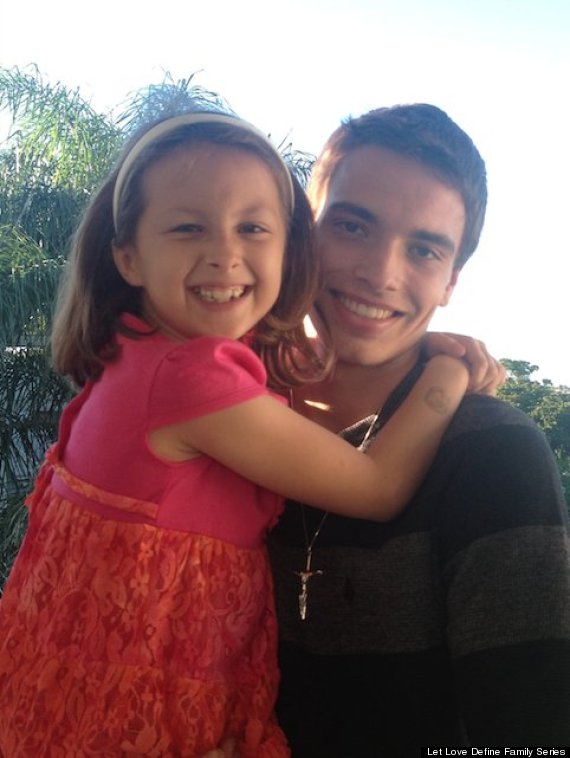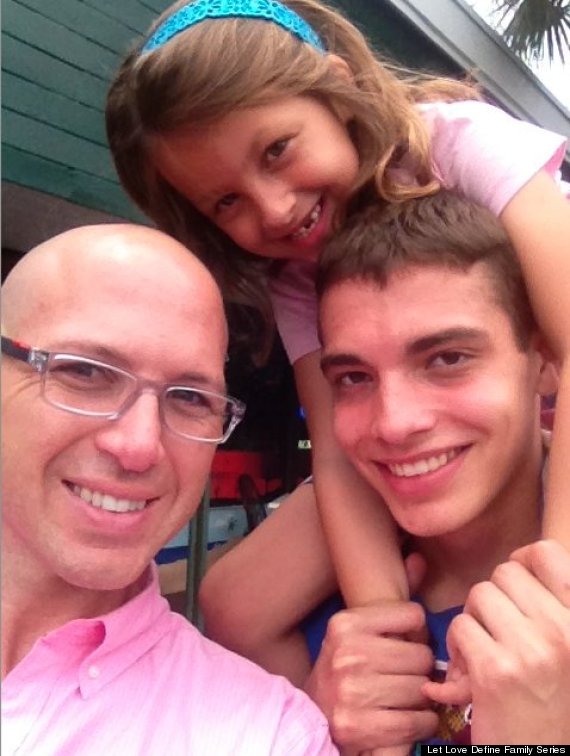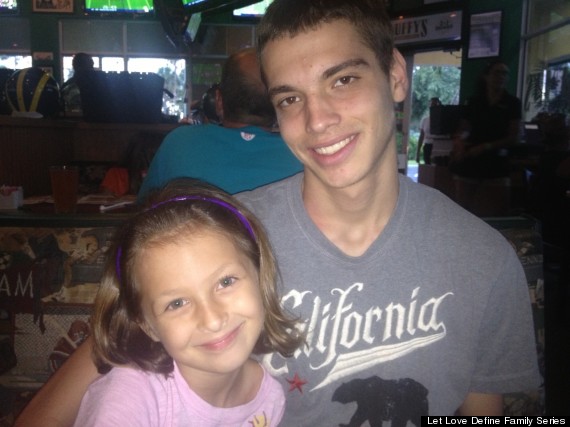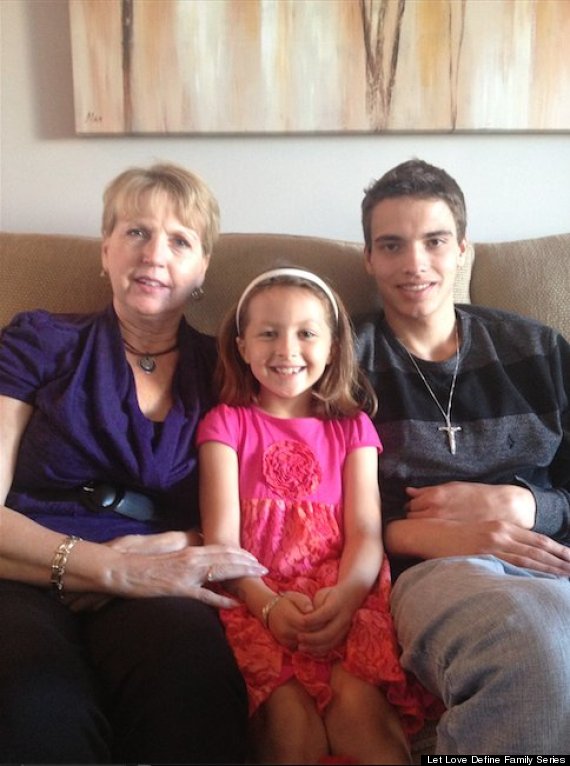In this Huffington Post Gay Voices RaiseAChild.US “Let Love Define Family™” series installment, I spoke with Robert Lamarche, LCSW, JD, who, along with his former partner, fought the legal system to help establish the right for LGBT people to adopt in Florida. -- Corinne Lightweaver, RaiseAChild.US
With so much focus on same-sex marriage and couples these days, there’s less visibility for the many single LGBT parents raising children. Some of these parents adopted while single; others came to single parenthood through divorce or the end of a relationship. Robert Lamarche of Oakland Park, Florida is one such father. He and his former partner Donald, 47, parented two children from the foster care system before an amicable split after nine and a half years together as a couple. Robert, a lawyer and licensed clinical social worker, and Donald, a registered nurse, were among the families who fought for adoption rights by gays and lesbians in Florida.
Corinne: You have had quite a journey building your family. Part of that was fighting the laws in the system that you worked in.
Robert: I have always worked in the child welfare field and I worked for both public and private adoption agencies while living in Massachusetts, which you know is starkly in contrast with Florida on the issues of gay marriage. Gay marriage happened in Massachusetts before I left the state in 2005 and gays and lesbians had adopted at least five years prior to that. As I was leaving, one my colleagues that I worked with said, “You know, it’s really interesting that you’re moving to Florida to a state where you can’t adopt to start your family.” And I remember saying to them, “Well, we’ll figure it out,” thinking that of course I would be able to adopt. Little did I know that a few years later I’d be sitting in court testifying as to why it would be ridiculous that I was not allowed to adopt the child the state of Florida had placed in my home.
I ended up going to law school because I became involved in the very first gay adoption case in Florida. An attorney was looking to adopt a child that had been in his care since the child was very young. His legal team was starting to search for someone to testify as an expert witness and found me. His legal team liked the irony of the fact that I was a social worker doing that type of work in Florida and yet I wouldn’t be able to adopt myself. The attorney’s adoption was granted. Going through that experience led me to law school. And the people that I met through that case helped me with my adoption of my son.
Corinne: Tell me about your children.
Robert: We adopted Kasey at age 13 from therapeutic foster care. He was one of my clients, as I was director of the program. We challenged Florida’s ban on gay’s adoption and won in August of 2008. I adopted him. He turned 20 yesterday and is a college freshman planning to enter social work to help kids in foster care. I’m proud that Kasey earned a 4.0 his first semester. Kasey is on the reserved side, very loyal and has a good sense of humor. Sharla was two and a half when she came to us as a foster child. We adopted her the following year on National Adoption Day. She is now seven and a social butterfly, excellent student and a lot of fun.

Corinne: Was the lawsuit a strain on your relationship?
Robert: Fighting the ban was very satisfying and deeply upsetting. Some of the responses to my adoption of Kasey were simply gross. Also, the gay community seemed a bit indifferent about what I was trying to achieve at times. I also felt very scrutinized and worried about being a perfect parent and perfect partner. And I was in a troubled relationship with my partner. Yes, I think there was some strain on the relationship around the uncertainty of forming a family. There was also some strain because only one of us technically was able to adopt at the time.
Corinne: Did you adopt Sharla before or after you and Donald split?
Robert: Before. Technically I adopted both of the children but we were together when we went through the adoption process for both of the kids. So he and I are parenting her together, as happens when people split up. She’s with me most nights and with him one night a week. He’ll pick her up from school a couple days a week so that they can spend time together. I encourage it.
Corinne: Does he live near by?
Robert: Yes, we’re about three miles from each other. We were intentional about that.

Corinne: Why did you choose fost/adoption as the way you wanted to build your family?
Robert: Kasey was already there in my life so it made perfect sense. I feel for kids in foster care and was always drawn to it. Additionally, I have always worked in nonprofits and come from a working class background. There was no money for a private adoption.
Corinne: What was the experience like?
Robert: Cumbersome, slow, anxiety-producing, at times scary even -- though I had the benefit of being an “insider.”
Corinne: Do the kids have difficulty explaining the divorce and having two dads who don’t live together?
Robert: I think part of Sharla’s age is that things aren’t a big deal. She’s never had a problem telling people that she has two dads and two moms. She likes to complicate the issue. She has her birth mother. And she has Mommy Shelly who was her foster mom. She tells people she has two dads -- my ex is “Dad” and I’m “Pop.” So she has four parents! And at this point in her life that’s cool because she wins; she has more. I think there will be a time when it’s going to be less cool that she has so many. But at this point she likes having two rooms at two different houses that she gets to decorate. She has asked if we would ever live together again. So I think there is a part of her that would prefer that we were still under the same roof.
With Kasey’s peer group in college, having two dads is not a big deal. When he was a teenager it was tough. It’s hard to be in middle school and have two gay dads because it makes you gay to your peers. I did a fair amount of educating Kasey’s schools about our family and my expectations of how they would support him if and when his peers did not. I don’t remember it ever being an issue in high school.
Corinne: Was he teased or bullied?
Robert: Absolutely, yeah. At one point his guidance counselor told him that if he didn’t want people to say anything to him he shouldn’t have told everybody that he had two dads, so I had to go to the school several times. This was right around the time that there was this rash of suicides by people who were perceived as being gay. There were so many of them in the media, and I went into the school and I was just very clear with the assistant principle and the guidance counselor: “Look my kid’s not going to be that kid on the news just because you’re not prepared and you don’t know how to do your job. This is never okay. We have an anti-bullying law in Florida that includes sexual orientation or perceived sexual orientation. You can’t let this slide.”
I felt like they heard me and it got better that year. I’m a realist and my approach to this has always been that I’m not going to change the hearts and minds of every 14 year old boy in the universe, but I’ve always taught my kids that they need to identify safe people in their lives so that if they’re having a hard time that they can go to them. Those safe people better damn well get it right. Those are my expectations for the guidance counselor. If Kasey needed to come to him or her or if he needed someone to lean on, they needed to get it right.

Corrinne: Do you think if you raised the kids in Massachusetts it would have been the same?
Robert: I think it depends where in Massachusetts. In Boston, I wouldn’t have had to do as much work with the school, but I think he would have gotten a lot of the same stuff from the kids.
Corinne: How has it been for you and the children with the divorce? Are people understanding or do they just not get it?
Robert: We were together for about nine-and-a-half years, so that’s a pretty long period of time. But even otherwise very supportive people just saw it as a break-up, like I was dating somebody and it just didn’t work out. Because our relationship wasn’t legitimized in the way that a traditional marriage with a marriage ceremony and a certificate, all that sort of stuff, it seemed like we kind of just broke up. It was really difficult to go through a break-up and feel that some people didn’t understand that I’m essentially going through a divorce.
Because I was the person who adopted both of our kids, when the relationship dissolved there wasn’t any question that legally the children are my children. I recognize that doesn’t put Donny in the greatest place, but we had a very amicable separation and Donny sees Sharla regularly.
Corinne: Are second parent adoptions done in Florida?
Robert: There are second parent adoptions. When we had our first son, it wasn’t available yet and by the time it became available I was in law school and only working part time so we just couldn’t afford to do it. We adopted our daughter when I was also in law school and the idea was that we were going to do it sometime after law school, but we just didn’t get to it. We wound up moving and buying a house and coming up with the extra funds was difficult. It’s not inexpensive; it probably would've been about $4,000. With me coming out of law school and us supporting two kids, we just didn’t have the money.
Corinne: I read that your mom is a very devout Baptist. Is it fair to say that your relationship with her has evolved since she moved from Vermont to be with you and the kids?

Robert: Yes, she moved from Vermont to Florida. You know, my mom is an interesting character. She’s always been a person of faith, but she has never diminished me, my partner, or my kids in any way. I think to my mom her priority is that she is my mom and my kids’ grandmother before anything else. She has had to reconcile me being gay with her faith, and she’s done that however she’s done it. But I don’t feel that her being a Baptist has been burdensome to me and my kids. I know my mom spoke with her minister many years ago when I came out and when she did not like the response that she got and changed churches. Even with this breakup, she and Donny are still close. Donny’s mom passed away and he has been calling my mom “Mom” for many years. She loves him, she cares about him, but at the end of the day when I went to her and said the relationship is over, my mom always defaults to she wants me to be happy. I told her I didn’t feel a need for her to take side and that she should feel free to continue her relationship with Donny as he needed her in that role, so there hasn’t been a problem.
Corinne: Does religion play any part in your life now?
Robert: I consider myself a Christian. I don’t attend services, but I say my prayers every night. I say prayers with my daughter every night. I taught my son the same prayers that my mother taught me when I was little. Whether or not he continues to pray on a nightly basis I’m not sure. My daughter was baptized in a church with friends and family a couple years ago. My mom certainly does some of that religious education with my daughter. She has children’s bible stories that they read together.
Corinne: What’s the best thing for you about being a parent?
Robert: I have always wanted to be a parent. I love my kids so much I can’t stand it. They both make me incredibly crazy at times, but in the end I wouldn’t change it. They give me purpose, a sense of belonging in the world. They are the first people I think of in the morning and the last ones before I go to bed. And I like being a gay parent. As a gay man, I’m not constrained by stereotypical heterosexual roles. I get to decide what kind of man I am in the world. I get to me my own best version of a father -- flawed, but doing my best to raise kind, confident and conscientious children.
Corinne Lightweaver is the Communications Manager at RaiseAChild.US, a national organization headquartered in Hollywood, California that encourages the LGBT community to build families through fostering and adopting to serve the needs of the 400,000 children in the U.S. foster care system. Since 2011, RaiseAChild.US has run media campaigns and events to educate prospective parents and the public, and has engaged more than 2,400 prospective parents. For information about how you can become a foster or fost-adopt parent, visit www.RaiseAChild.US.